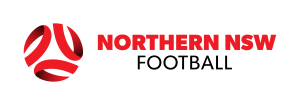Northern NSW Football’s inaugural Pride Round is this weekend 23 to 25 June, promoting and supporting the diversity and inclusion of the LGBTQI+ communities and families within the football community.
We spoke with Newcastle Olympic FC’s Georgia Amess about her journey and experiences as a gay female footballer. The 28-year-old attacker has been an integral part of Olympic’s NPL Women’s NNSW side for the last four seasons and continues to be a leader for young girls on and off the pitch.
NNSWF: Can you give an overview of your life and career in football?
Georgia Amess: I have been playing football since I was five years old, always with the boys. I was always in A Grade boy’s competitions right up until I was 15. In my junior years I played for Beresfield United SSC and Maitland Junior Football Club. I loved it. It was quick, it was fast, it was aggressive and it was good for development in my own football.
When I was 17 I made my WPL debut for Merewether United Football Club. Since then I have continued to play in the WPL for Wallsend, South Wallsend and New Lambton. I then moved to Newcastle Olympic FC, where I have been for the past four seasons.
NNSWF: What are some of your career highlights as a footballer?
GA: One of my earliest career highlights would be captaining my school football team into the Bill Turner Trophy at the age of 15.
Another highlight in my football career would be making my WPL debut at the age of 17 for Merewether. To be given the opportunity to play with current W-League players and ex Matildas at such a young age was amazing.
The 2018 and 2019 seasons with New Lambton was also a big high point. I made the Team of the Year in 2018 and scored a bucket load of goals. We got minor and major premiers in both first grade and reserve grade. We weren’t the best team on paper but we were able to defy the odds.
NNSWF: How important is inclusion and diversity in football?
GA: It think it is massive. If we, at the grassroots level, are able to show young people in the community that no matter what your pronouns are or how you identify, everyone is welcome. I think that’s a really important message to showcase.
NNSWF: How does football support inclusion and diversity?
GA: This was the first year the A-Leagues held a Pride Round and it’s amazing to see that the top level is starting to be open to inclusion and diversity and that then stems down to the grassroots. This is exactly what Northern NSW Football are doing this year, showing that everyone should be included and has a place in our game.
NNSWF: What could football do better to be more inclusive?
GA: Pride Rounds definitely could have come a long time ago within football and not waited for other codes to make the stand. Especially since there are and have been many Matildas players that are a part of the LGBTQ+ community. Football could have taken the steps earlier.
I think that in the male game it is still very much prevalent. In the men’s game sometimes on the sideline you can hear people calling each other f----- and things like that. There still is that homophobic nature in the game, even if people aren’t realising that those derogatory comments towards each other are so hurtful for the people who actually live those lives.
NNSWF: What is it like being a LBGTQ+ female in football?
GA: For me personally I feel included and have had a very pleasant experience. I haven’t experienced any homophobic comments, negative backlash or anything like that as a gay player. In all of the clubs I have been a part of, I have never felt like I have been disadvantaged because I am gay. I have always felt supported.
But obviously, I am aware that other people have had and continue to have different experiences that are very negative.
NNSWF: How important is it to have Pride Round?
GA: I feel like because there haven’t been Pride Rounds in previous years, that maybe it wasn’t seen as a big deal. Now everyone is starting to realise that we do need to show and highlight the need for these rounds, making sure that everyone feels included no matter what. It’s so important to put an emphasis on the fact that everyone is welcome and it’s not just hetero people that can participate in football.
NNSWF: What are the positives of being a female footballer in 2023?
GA: Being a part of a community that is bigger than yourself. You aren’t just playing for your team, you are playing for your club and your community.
We are in such an exciting space for women’s football at the moment, especially with the World Cup coming up in Australia. It will highlight women’s football to a whole other level. It will really show these young girls that if you want to go and play a sport that has been typically known for boys then you can go and play that sport, that’s okay. I think that’s really cool to see.
